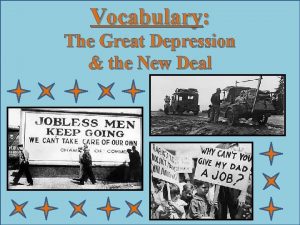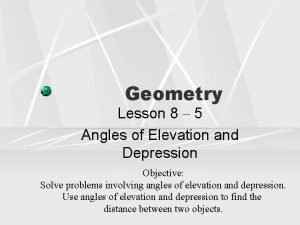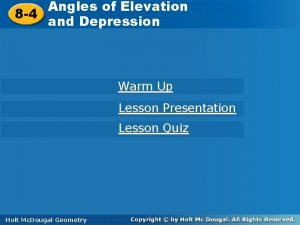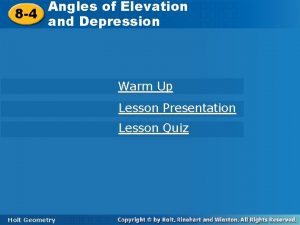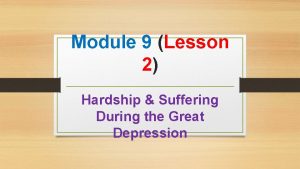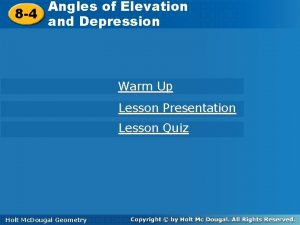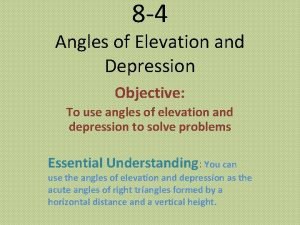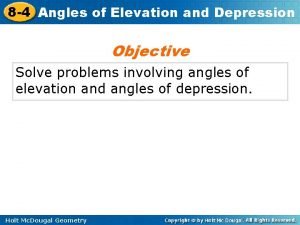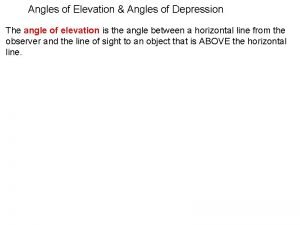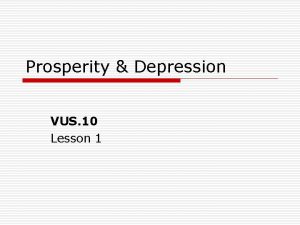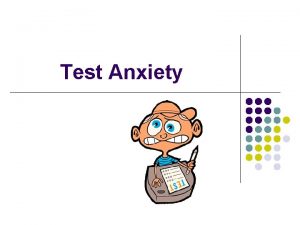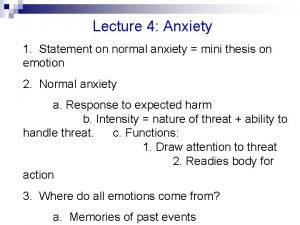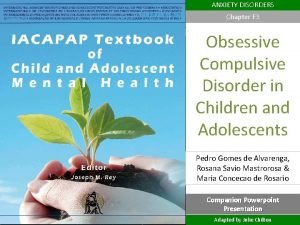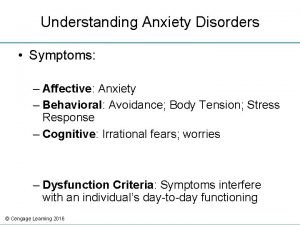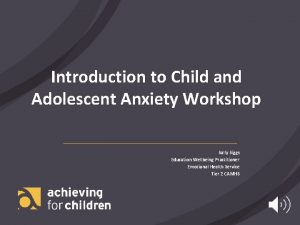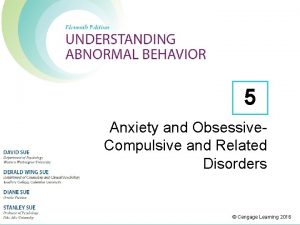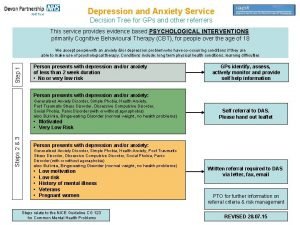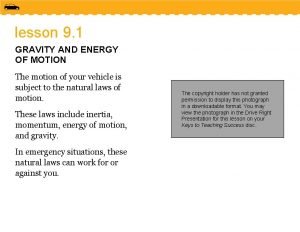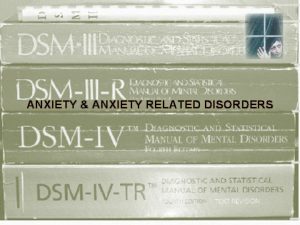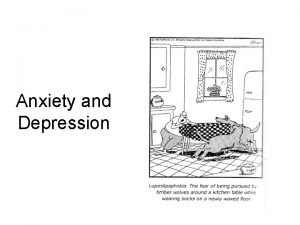Affect Anxiety and Depression Anxiety Questions How often






















































































































- Slides: 118

Affect Anxiety and Depression

Anxiety Questions How often do you feel worried, nervous or anxious? Daily, Weekly, Monthly, A few times a year, or Never? Do you take medication for anxiety? Thinking about the last time you felt anxious, how would you describe the level of anxiety? Mild, moderate or severe? Thinking about the last time you felt anxious, was the anxiety worse than usual, better than usual, or about the same as usual?

Depression Questions How often do you feel depressed? Daily, weekly, monthly, a few times a year, or never? Do you take medication for depression? Thinking about the last time you felt depressed, how depressed did you feel, a little, a lot, or somewhere in between a little and a lot? If somewhere in between: Would you say the depression was closer to a little, closer to a lot, or exactly in the middle? Thinking about the last time you felt depressed, was the depression worse than usual, better than usual, or about the same as usual?

Anxiety Findings • Aspects of anxiety reported – Stress • Workload, deadlines, performances • Relationship/family problems • Dread/concern about future – Economic security – Health concerns – Clinical/diagnosed anxiety – Excitement/Positive energy • Confusion over ‘medication for anxiety’

Cognitive interview data: Basis of anxiety reports by gender

Cognitive interview data: Basis of anxiety reports by country

Depression Findings Interpretation overlap in anxiety and depression, with a few exceptions (excitement vs. grief) • – – Similar words being used in narratives: worries, stress, anxiety Evidence that some respondents spoke about not seeing the difference, stating they just answered the question

Depression Findings Multiple types of interpretations • Stress – • • • Workload, deadlines, performances Relationship/family problems Dread/concern about future – – Economic security Health concerns Clinical/diagnosed depression Grief

Cognitive interview data: Basis of depression reports by country

Summary of Affect Cognitive Findings • Variation in basis for answers (which may be related to socio-cultural factors) • Some interpretations potentially out of scope

Revisions for Field Test Questionnaire Lack of information: use field test to fill in gaps Interpretive variation: use field test to examine comparability Screener question: added an additional question for screening Anxiety medication: revised question

Anxiety Field Test How often do you feel worried, nervous or anxious? Daily, Weekly, Monthly, A few times a year, Never Do you take medication for these feelings? Thinking about the last time you felt worried, nervous or anxious, how would you describe the level of these feelings? A little, A lot, Somewhere in between a little and a lot Would you say this was closer to a little, closer to a lot, or exactly in the middle?

Anxiety Field Test Please tell me which of the following statements, if any, describe your feelings. – My feelings are caused by the type and amount of work I do. – Sometimes the feelings can be so intense that my chest hurts and I have trouble breathing. – These are positive feelings that help me to accomplish goals and be productive. – The feelings sometimes interfere with my life, and I wish that I did not have them. – If I had more money or a better job, I would not have these feelings. – Everybody has these feelings; they are a part of life and are normal. – I have been told by a medical professional that I have anxiety.

Depression Field Test How often do you feel depressed? Daily, Weekly, Monthly, A few times a year Do you take medication for depression? Thinking about the last time you felt depressed, how depressed did you feel? A little, A lot, Somewhere in between a little and a lot Would you say this was closer to a little, closer to a lot, or exactly in the middle?

Depression Field Test Please tell me which of the following statements, if any, describe your feelings. My feelings are caused by the death of a loved one. Sometimes the feelings can be so intense that I cannot get out of bed. The feelings sometimes interfere with my life, and I wish I did not have them. If I had more money or a better job, I would not have these feelings. Everybody has these feelings; they are part of life and normal. I have been told by a medical professional that I have depression.

Field Test Data Maldives and Sri Lanka: Percentage reporting anxiety

Field Test Data Maldives and Sri Lanka: Characteristics of reported anxiety Reports of anxiety Maldives, N=538 Sri Lanka, N=215

Field Test Data Maldives and Sri Lanka: Anxiety How often do you feel worried, nervous or anxious? Daily Weekly Monthly A few times a year Never Yes 20 6 4 12 0 2. 1% No 177 106 82 343 1212 97. 9% 10. 0% 5. 7% 4. 4% 18. 1% 61. 8% 1962 Do you take medication for these feelings?

Field Test Data Maldives and Sri Lanka: Anxiety How often do you feel worried, nervous or anxious? Daily Weekly Monthly A few times a year Never A little 59 46 34 188 0 44. 6% In between 21 19 21 57 0 39. 4% A lot 113 47 28 101 0 16. 1% 26. 3% 15. 3% 11. 3% 47. 1% 0. 0% 734 Thinking about the last time you felt worried, nervous or anxious, how would you describe the level of these feelings?

Field Test Data Maldives and Sri Lanka: Percentage reporting depression

Field Test Data: Characteristics of reported depression Reports of depression Maldives, N=421 Sri Lanka, N=125

Field Test Data Maldives and Sri Lanka: Depression How often do you feel depressed? Daily Weekly Monthly A few times a year Never Yes 9 2 1 9 0 1. 1% No 92 84 58 287 1371 98. 9% 5. 3% 4. 5% 3. 1% 15. 4% 71. 3% 1923 Do you take medication for these feelings?

Field Test Data Maldives and Sri Lanka: Depression How often do you feel depressed? Daily Weekly Monthly A few times a year Never A little 13 21 15 145 0 36. 6% In between 10 14 16 47 0 16. 4% A lot 75 47 28 99 0 47. 0% 18. 5% 15. 5% 11. 1% 54. 9% 0 530 Thinking about the last time you felt depressed, how depressed did you feel?

Field Test Data Maldives and Sri Lanka: Anxiety and Depression Initial Questions How often do you feel depressed? How often do you feel worried, nervous or anxious? Daily Weekly Monthly Few times Never a year Daily 68 30 8 23 65 Weekly 8 25 12 35 31 Monthly 6 5 19 21 35 Few 9 times a year 18 8 160 159 Never 13 11 58 1188 11

Field Test Data: Are the 2 questions capturing 2 important aspects of affect? Blue= More Depressed than Anxious How often do you feel depressed? Red=More Anxious Daily than Depressed Weekly Daily Weekly Monthly Few times a year Never 68 30 8 23 65 8 25 12 35 31 5 19 21 35 18 8 160 159 13 11 58 1188 How often do you Monthly 6 feel worried, nervous or Few 9 anxious? times a year Never 11

Characteristics of Anxiety for 3 Groups Reports of anxiety More Anxious, N=147 Same (minus none), N=270 More Depressed, N=419

Characteristics of Depression for 3 Groups More Anxious, N=147 Same (minus none), N=270 More Depressed, N=419

Sri Lanka’s Experiences

Cambodia’s Experiences

LEARNING

Learning Questions Do you have difficulty understanding and using information like following directions to get to a new place? Do you have difficulty learning new things such as the rules for a new game? How much difficulty did you have in analyzing and finding solutions to problems in day to day life?

Learning Findings Analyzing and finding solutions • Interpretations: – Examples: family issues, work issues, money problems, interpersonal relations, neighborhood crime and even being able to do puzzles. • Some Rs had difficulty understanding the question – Particular difficulty with the word “analyze” – Potential problem with lower SES

Learning Findings Using information like following directions • Primarily seen as asking about finding a new place, which involves varied interpretations: – – • following directions, using a map, reading street signs, and needing assistance to walk or use transportations However, some Rs never go to new places and answer either ‘no difficulty’ or ‘can’t do at all. ’ Other interpretations included thinking & logic skills at work, school work, directions for household chores, following directions in general.

Learning Cognitive Findings Learning new things… rules for a new game • Primarily seen as asking about learning a new game, which involves: – Level of difficulty of game, directions written or spoken • For those who never play games, answers range from ‘no difficulty, ’ don’t know, ‘can’t do at all’ or no answer given. • Other interpretations included putting furniture together, learning how to feed livestock, cooking, dancing, school work, life in general.

Summary of Learning Cognitive Findings • Questions were not getting at general learning but were being interpreted as asking about the specific example – games and following instructions

Revisions for Field Test Questionnaire • Add cell phone to adult questions so that respondents would focus on learning rather than the example • Added a probe question to learn more about how respondents were answering the question

Learning Field Test • Do you have difficulty learning the rules for a new game? • Do you have difficulty understanding and following instructions for example, to use a new cell phone or to get to a new place? • Can you tell me how you arrived at your answer? Why did you answer [fill in respondent’s answer]?

Field Test Data Maldives and Sri Lanka: Do you have difficulty learning the rules for a new game? (all ages)

Field Test Data Maldives and Sri Lanka: Do you have difficulty learning the rules for a new game?

Field Test Data Maldives and Sri Lanka: Do you have difficulty understanding and following instructions for example, to use a new cell phone or to get to a new place? (adults only)

Field Test Data: Maldives and Sri Lanka Learn 1 by Learn 2 (Adults) Do you have difficulty learning the rules for a new game? Do you have difficulty understanding and following instructions for example, to use a new cell phone or to get to a new place? None Some A lot Unable DK/Ref None 1275 37 9 1 35 Some 39 88 10 0 3 A lot 14 15 31 1 1 Unable 2 0 4 17 1 DK/Ref 0 1 0 0 9 N=1, 607

Philippines – cognitive test • On understanding and using information to get to a new place – The question asked two different things. If the respondent could not do one of these, the response is based on that difficulty – One of the respondent who was blind since childhood answered that he could follow direction. This raised doubts after the interview on the extent the respondent could see (which he earlier reported as “cannot see at all”

Philippines – cognitive test • On understanding and using information to get to a new place – The respondent sometimes interchanged using information with getting to the correct place – A respondent asked if some difficulty and a lot of difficulty relates to the period she finally gets to the new place

Philippines – cognitive test • Learning new things as the rules for a new game – For older respondents and those in the low SES, the question was insulting. About five respondents mentioned that they have to work to earn, thus, do not have time to learn a new game – Other respondents were more polite and just said that “we have not played a new game” for a long time

Philippines – cognitive test • Learning new things as the rules for a new game – In one case, instead of new game, the respondent mentioned that she can be asked instead about learning how to cook a new dish.

Philippines – cognitive test • Analyzing and finding solutions to day-to-day life – In most of the cognitive interviews, the respondent just stared and simply could not give an answer, possibly, due to the use of day-to-day – A respondent, however, mentioned that his analysis and solution will depend on the information that he gets

Philippines – cognitive test • Analyzing and finding solutions to day-to-day life – In one instance, the respondent was becoming emotional pointing that learning is related to a lot things like money, environment and sibling

Philippines – field test • Learning the rules for a new game – In most cases, there is a need for further explanation – Interviewers reported that they have to probe the answer if it is really for a new game • Difficulty understanding and following instructions – Use of a new cell phone and to get to a new place generates completely different responses in most cases

COGNITION

Cognition Questions Do you have difficulty remembering or concentrating? Split Sample Experiment Version 1: How often do you have difficulty remembering important things? Thinking about the last time you had difficulty remembering important things, how much difficulty did you have?

Cognition Questions Split sample experiment Version 2: Do you have difficulty remembering a few things, a lot of things, or almost everything? All respondents: How much difficulty did you have in concentrating on doing something for ten minutes?

Cognition Findings Remembering or concentrating • No one had difficulty providing an answer. • Most thought of remembering only or of both remembering and concentrating when answering this question; only a few thought only of concentration. • Rs considered a variety of day-to-day items: Examples: telephone numbers, names, a word, chores, taking medicine, birthdays, dates, misplacing items, appointments, pin numbers. • Serious and minor examples formed the basis for responses

Cognition Findings R remembering important things • Varied understand of “important things” • From the trivial (forgetting to brush teeth) to the more serious (forgetting where one lives) and everything in between. • Some respondents directly asked what was meant by important (“Would that be your wife’s birthday? ”).

Cognition Findings The last time… how much difficulty • Little cognitive interview data • Many Rs experienced difficulty with the question. – Couldn’t answer – Needed it repeated – Though it was no different from the previous question – Asked what was meant by “important things”

Cognition Findings Difficulty remembering a few things, a lot of things, or almost everything • Little cognitive interview data, especially relating why Rs answered the way they did • Examples given were similar to previous questions: needing a grocery list, remembering appointments, chores, or names, or misplacing an item.

Cognition Findings Doing something for 10 minutes • Intent of question primarily not understood by Rs Many respondents said “it depends” based on: • Desirability of the task Complexity of the task Familiarity of the task Number of distractions present while doing the task Some Rs overly focused on 10 minutes • – – Thinking “if a task only takes 10 minutes to accomplish, it must not be a very difficult task, ” then answering ‘none’ Thinking “ 10 minutes isn’t enough time to accomplish almost anything, ” then answering ‘severe. ’

Summary of Cognition Cognitive Findings • • Very few respondents reported only concentrating to ‘remembering and concentrating’ question Wide range of things reported as examples of remembering Responses to question on concentrating varied by a range of factors relating to the task. Some respondents focused on 10 minutes not concentrating

Revisions for Field Test Questionnaire • Added follow-up questions to short set question to get at remembering, concentrating or both • Added probes to get to describe remembering difficulties

Cognition Field Test Do you have difficulty remembering or concentrating? Do you have difficulty remembering, concentrating, or both? How often do you have difficulty remembering? Do you have difficulty remembering a few things, a lot of things, or almost everything? (Probe question – next slide) How much difficulty do you have concentrating for 10 minutes?

Cognition Field Test Please tell me which of the following statements, if any, describe your difficulty remembering: I forget things because I am busy and have too much to remember. My difficulty is getting worse. My difficulty has put me or my family in danger. I only forget little or inconsequential things. I must write down important things, such as my address or when to take medicine, so that I do not forget. My family members or friends are worried about my difficulty remembering. My difficulty is normal for someone my age.

Field Test Data Maldives and Sri Lanka: Percentage reporting cognitive difficulty Type of difficulty for reported cases

Maldives and Sri Lanka: For those reporting difficulty remembering Frequency of difficulty Number of things forgotten

Field Test Data Maldives and Sri Lanka: Characteristics of reported difficulty remembering (from probe question) Reports of difficulty Maldives, N=263 Sri Lanka, N=238

Field Test Data: Concentrating question Percent reporting difficulty concentrating for 10 minutes Percent of interviewer-coded response problems

Field Test Data: Maldives and Sri Lanka Memory and Concentration Questions How often do you have difficulty remembering? How much difficulty do you A little have concentrating Somewhere for 10 minutes? In between A lot Sometimes Often All the time 29 10 2 4 2 1 8 14 11

Field Test Data Maldives and Sri Lanka: Cognition How often do you have difficulty remembering? Do you have Sometimes Often difficulty remembering a 49 few things, a lot of A few things 326 thing, or almost everything? A lot of things 21 51 Almost everything 2 4 All the time 5 19 13

Maldives’ Experiences

MOBILITY

Mobility Questions Do you have any difficulty walking or climbing steps? Do you use any equipment or receive help for getting around? If Yes: Do you use any of the following? a. cane or walking stick b. walker (Zimmer frame) c. crutches d. wheelchair e. prosthesis(es) f. someone’s assistance g. other (specify: ______) If more than one: Which [aid/assistance] do you use most often?

Mobility Questions Do you have difficulty walking 100 (meters/yards) on level ground, that would be about (insert country-specific example) [without the use of your [insert aid]]? Do you have difficulty walking 500 (meters/yards) on level ground, that would be about (insert country-specific example) [without the use of your [insert aid]]? Do you have difficulty walking up or down [insert countryspecific example: a flight of stairs / 12 steps / a small hill] [without the use of your [insert aid]]?

Mobility Questions Split sample experiment: Do you have difficulty walking around in your home [without the use of your [insert aid]]? How much difficulty did you have in moving around inside your home? [without the use of your [insert aid]]?

Mobility Questions Do you have difficulty walking 100 (meters/yards) on level ground, that would be about [insert country-specific example], even when using your [insert aid]? Do you have difficulty walking 500 (meters/yards) on level ground, that would be about [insert country-specific example], even when using your [insert aid]? Do you have difficulty walking up or down [insert countryspecific example: a flight of stairs / 12 steps / a small hill], even when using your [insert aid]?

Mobility Questions Split Sample Experiment: Version 1: How much difficulty did you have in moving around inside your home, even when using your [insert aid]? Version 2: Do you have difficulty walking around in your home, even when using your [insert aid]?

Mobility Findings Assistive Device • Some, but not enough evidence to know if clause works (when correctly used) • • Administration Problems: Interviewer not always correctly inserting the aid clause in the question Some uncertainty of what to count: – Some aids are viewed as ‘so much a part of the person’ that they are not considered or are not sure if should count (e. g. prosthesis, bolt in knee)

Mobility Findings Assistive Device • The use of other’s assistance: – was more of a problem than the other aids – hard to define, on what occasion and for what purpose? – because so pervasive—for even those without serious disability • Wheelchair creates problems for questions ‘with the use of your aid’ • For climbing stairs question, some respondents consider railing, but others don’t – Railing is big impact on ability to climb stairs

Mobility Findings Distance • Example is important; much evidence that example is necessary for a respondent to understand • Example for stairs is not working as consistently • Still some evidence of not knowing example and that this can generate error • The example chosen may bias—e. g. gender and football field example

Mobility Findings Walking and Moving Around Questions • Context is more detailed. Specific to their own home and how it is structured – – – • What they do in their home vs. not at home (e. g. work at a computer sitting and standing) Lighting Amount of space Layout including stairs or lack of stairs Clutter or messiness of home Switching categories confused some respondents

Summary of Mobility Cognitive Findings • Consistent interpretations across countries • Respondents apply assistive device clause appropriately when they are administered correctly • Distance example important but still some concerns • Administration of questions is critical piece for aid clause and distance examples

Revisions for Field Test Questionnaire Moving around selected over walking around Examples of distance provided Walking up or down reduced to 12 steps Handrail probe added

Mobility Field Test Do you have any difficulty walking or climbing steps? Do you have difficulty moving around inside your home? Do you use any equipment or receive help for getting around? Do you use any of the following? Cane or walking stick? Walker? Or Zimmer frame? Crutches? Wheelchair? Prothesis(es)? Someone’s assistance? Other: ________

Mobility Field Test Do you have difficulty walking 100 (meters/yards) on level ground, that would be about the length of one (1) football field or one (1) city block [without the use of your aid]? Do you have difficulty walking half a km/ a third of a mile on level ground, that would be the length of five (5) football fields or five (5) city blocks [without the use of your aid]? Do you have difficulty walking up or down 12 steps [without the use of your aid]? How much difficulty would you have going up or down those steps without using a handrail? (Probe)

Mobility Field Test Do you have difficulty walking 100 (meters/yards) on level ground, that would be about the length of one (1) football field or one (1) city block, when using your aid? Do you have difficulty walking half a km/ a third of a mile on level ground, that would be the length of 5 football fields or 5 city blocks, when using your aid? Do you have difficulty walking up or down 12 steps, even when using your aid?

Mobility: Country prevalence Do you have difficulty walking or climbing steps?

Field Test Data Maldives and Sri Lanka: Mobility Do you have difficulty walking or climbing steps? None Do you have difficulty moving Some around inside your home? A lot Can’t None Some A lot Can’t 1477 289 76 0 89. 5% 3 106 56 0 8. 0% 0 2 40 2 2. 1% 0 0 0 6 0. 3% 8. 4% 0. 4% 2, 057 71. 9% 19. 3%

Field Test Data Maldives and Sri Lanka: Mobility Do you have difficulty walking 100 meters on level ground…without the use of your aid? None Do you have difficulty walking half a km on level None 1562 ground…without the use of your aid? Some 111 Some A lot Can’t 1 0 0 77. 3% 153 3 0 13. 2% A lot 24 68 80 0 8. 5% Can’t 0 4 14 1 0. 9% 84. 0% 11. 2% 4. 8% 0. 0% 2, 021

Mongolia’s Experiences

Maldives’ Experiences

VISION

Vision Questions 1. Do you have difficulty seeing, even when wearing glasses? 2. Do you wear glasses to see far away? 3. Do you wear glasses to see up close? 4. Do you wear glasses for another reason? (specify): ______

Vision Questions 5. Do you have difficulty clearly seeing someone’s face across a room [even when wearing your glasses]? 6. Do you have difficulty clearly seeing the picture on a coin [even when wearing your glasses]?

Vision Findings 1. Do you have difficulty seeing, even when wearing glasses? Issues: age, night vision, prescription, health problem (e. g. glaucoma, detached retina, cataracts), glasses clause 2. Do you wear glasses to see far away? Issues: have difficulty versus need for glasses 3. Do you wear glasses to see up close? Issues: have difficulty versus need for glasses, have difficulty versus use of glasses, need for examples 4. Do you wear glasses for another reason? (specify): sun/safety

Vision Findings 5. Do you have difficulty clearly seeing someone’s face across a room [even when wearing your glasses]? Issues: size of the room seems to matter though most people thought of their own house or office or the interview room 6. Do you have difficulty clearly seeing the picture on a coin [even when wearing your glasses]? Issues: size of the coin seems to matter, as did the distance the coin is held from face

Revisions for Field Test Questionnaire 1. Glasses clause seemed to cause some confusion so – the order of the questions was changed to link the difficulty to the use of glasses and – your glasses was changed to these glasses to make a connection use of glasses and experienced difficulty 2. Example added to seeing close up 3. Use of glasses for other reasons dropped

Vision Field Test Do you have difficulty seeing, even when wearing glasses? Do you wear glasses to see far away? Do you have difficulty clearly seeing someone’s face across a room [even when wearing these glasses]? Do you wear glasses for reading or to see up close? Do you have difficulty clearly seeing the picture on a coin [even when wearing these glasses]?

Vision: Country prevalence Do you have difficulty seeing, even when wearing glasses?

Field Test Data Maldives and Sri Lanka: Vision Do you have difficulty seeing, even when wearing glasses? None Do you have difficulty seeing clearly someone’s None 1570 face across a Some 4 room? Some A lot Can’t 266 48 0 92. 7% 87 23 0 5. 6% A lot 1 9 25 0 1. 7% Can’t 0 0 0. 0% 2, 052 77. 4% 17. 8% 4. 7%

Field Test Data Maldives and Sri Lanka: Vision Do you have difficulty seeing, even when wearing glasses? Do you have difficulty clearly seeing the picture on a coin? None Some A lot Can’t None 1558 267 50 0 92. 2% Some 13 90 20 0 6. 0% A lot 1 7 25 0 1. 6% Can’t 0 1 1 0 0. 1% 0. 0% 2, 034 77. 3% 17. 9% 4. 7%

Field Test Data Maldives and Sri Lanka: Vision Do you wear glasses to see far away? Do you have difficulty seeing clearly someone’s face across a room? Yes No None 263 1622 92. 7% Some 25 89 5. 6% A lot 10 25 1. 7% Can’t 0 0 0. 0% 14. 7% 85. 3% 2, 034

Field Test Data Maldives and Sri Lanka: Vision Do you wear glasses for reading or to see close up? Do you have difficulty clearly seeing the picture on a coin? Yes No None 446 1428 92. 3% Some 34 89 6. 1% A lot 16 16 1. 6% Can’t 0 2 0. 1% 24. 4% 75. 6% 2, 031

HEARING

Hearing Questions 1. Do you have difficulty hearing, even if using a hearing aid? 2. Do you use a hearing aid? 3. If yes: How often do you use your hearing aid(s)?

Hearing Questions 4. Do you have difficulty hearing what is said in a conversation with one other person in a noisy room [even when wearing your hearing aid(s)]? 5. Do you have difficulty hearing what is said in a conversation with one other person in a quiet room [even when wearing your hearing aid(s)]?

Hearing Findings 1. Do you have difficulty hearing, even if using a hearing aid? Issues: hearing aid clause, clarity of speech, distance to person speaking, background noise 2. Do you use a hearing aid? Issues: didn’t know what a hearing aid was 3. If yes: How often do you use your hearing aid(s)? Issues: none (little response)

Hearing Findings 4. Do you have difficulty hearing what is said in a conversation with one other person in a noisy room [even when wearing your hearing aid(s)]? Issues: age, distance, concentration, shouting; define noisy – many examples: TV, meetings, parties, loud music, sporting events 5. Do you have difficulty hearing what is said in a conversation with one other person in a quiet room [even when wearing your hearing aid(s)]? Issues: background noise, concentration, position of speaker

Revisions for Field Test Questionnaire Hearing aid clause: if changed to when Noisy and quiet room questions reversed to help define noisy

Hearing Field Test 1. Do you have difficulty hearing, even when using a hearing aid? 2. Do you use a hearing aid? 3. How often do you use your hearing aid(s)? All of the time, Some of the time, Rarely, Never 4. Do you have difficulty hearing what is said in a conversation with one other person in a quiet room [even when wearing your hearing aid(s)]? 5. Do you have difficulty hearing what is said in a conversation with one other person in a noisier room [even when wearing your hearing aid(s)]?

Hearing: Country prevalence Do you have difficulty hearing, even when using a hearing aid?

Interviewer-coded response issues

Field Test Data Maldives and Sri Lanka: Hearing Do you have difficulty hearing, even when using a hearing aid? Do you have difficulty hearing what is said in a conversation with one other person in a quiet room? None Some A lot Can’t 1833 90 4 0 93. 9% Some 24 67 6 0 4. 7% A lot 3 5 20 0 1. 4% Can’t 0 0 0. 0% 90. 6% 6. 9% 1. 5% 0. 0% 2, 052 None

Field Test Data Maldives and Sri Lanka: Hearing Do you have difficulty hearing, even when using a hearing aid? Do you have difficulty hearing None what is said in a conversation with one other person Some in a noisier room? A lot Can’t None Some A lot Can’t 1759 29 1 0 87. 6% 77 100 4 0 8. 9% 12 32 20 0 3. 1% 1 2 5 0 0. 4% 90. 6% 8. 0% 1. 4% 0. 0% 2, 052

Field Test Data Maldives and Sri Lanka: Hearing Do you have difficulty hearing what is said in a conversation with one other person in a quiet room? Do you have difficulty hearing None what is said in a conversation with one other person Some in a noisier room? A lot Can’t None Some A lot Can’t 1770 13 3 0 87. 6% 120 59 2 0 8. 9% 23 22 19 0 3. 1% 1 3 4 0 0. 4% 93. 9% 9. 8% 1. 3% 0. 0% 2039

LIFE ACTIVITIES

Life Activity Questions For the following questions, please keep in mind that I am asking only about difficulties you experienced in the last 30 days that are due to a health problem. In the last 30 days: • how much difficulty did you have in taking care of your household responsibilities? • how much difficulty did you have in your day to day work/ school? • how much of a problem did you have in joining in community activities, for example, festivities, religious or other activities in the same way as anyone else can? • how much of a problem did you have because of barriers or hindrances in the world around you? • how much have you been emotionally affected by your health condition?

Life Activity Findings Introductory statement: Not clear who is meant to respond to the questions – those who indicated that they had a health problem in the past 30 days, or everyone; whether the interviewer is to screen out respondents or if the respondent should interpret the question as: “If you have had a health problem in the last 30 days…how much difficulty…? ” The questions were delivered inconsistently. The clause “due to a health problem” was interpreted inconsistently by respondents.

Life Activity Findings In the last 30 days: Some evidence that respondents focused on that single 30 day period and didn’t consider difficulties that were pre-existing and persisted throughout For those with disabilities or chronic conditions there was evidence that if they were not unusually ill or had a worsening condition, they reported no difficulty or problem.

Life Activity Findings Formulating responses: Throughout there is no clear indication as to why respondents came to their answers – why they answered mild as opposed to moderate. Seems that difficulty in understanding the purpose of the question leads to inconsistent and random responses.

Life Activity Findings Activities: Household responsibilities included in-home physical labor (cooking, cleaning, laundry), childcare, outside home labor (to support the household) Work/school: difficult for those who did not work outside the home or go to school and for those who interpreted the previous question as ‘supporting the household’ and reported there about their work. Community activities: evidence that respondents were veering away from health-related issues; some answered none because they didn’t do those kinds of activities Barriers: several respondents did not understand the question; evidence that respondents were veering away from healthrelated issues (traveling by bus to get water, not having enough money).

Revisions for Field Test Questionnaire Recommend that these questions be dropped.
 Chapter 5 lesson 1 dealing with anxiety and depression
Chapter 5 lesson 1 dealing with anxiety and depression Chapter 5 lesson 1 dealing with anxiety and depression
Chapter 5 lesson 1 dealing with anxiety and depression Stress anxiety depression
Stress anxiety depression Anxiety in the heart of man causes depression
Anxiety in the heart of man causes depression How did the great depression affect south carolina
How did the great depression affect south carolina Often sometimes usually
Often sometimes usually Angle of elevation and depression
Angle of elevation and depression Make tag questions for the following sentences
Make tag questions for the following sentences Hoover and roosevelt compare and contrast
Hoover and roosevelt compare and contrast Chapter 8 managing stress and anxiety
Chapter 8 managing stress and anxiety Frustration anxiety and tension
Frustration anxiety and tension Chapter 15 anxiety and obsessive-compulsive disorders
Chapter 15 anxiety and obsessive-compulsive disorders Verbal escalation continuum cpi
Verbal escalation continuum cpi Difference between anxiety and stress
Difference between anxiety and stress Tennessee valley authority new deal
Tennessee valley authority new deal Prosperity and depression worksheet answers
Prosperity and depression worksheet answers Angle elevation
Angle elevation October 29 1929
October 29 1929 Angle of elevation and depression examples
Angle of elevation and depression examples 8-4 angles of elevation and depression
8-4 angles of elevation and depression 8-5 angles of elevation and depression
8-5 angles of elevation and depression Module 9 lesson 2
Module 9 lesson 2 Guided reading hardship and suffering during the depression
Guided reading hardship and suffering during the depression Lesson 8-4 angles of elevation and depression answer key
Lesson 8-4 angles of elevation and depression answer key Angles of elevation and depression
Angles of elevation and depression 8-4 angles of elevation and depression
8-4 angles of elevation and depression Pros and cons of the great depression
Pros and cons of the great depression Innovatemeaning
Innovatemeaning Angles of elevation and depression
Angles of elevation and depression Angle of depression
Angle of depression Us history eoc review the great depression and the new deal
Us history eoc review the great depression and the new deal Prosperity and depression worksheet answers
Prosperity and depression worksheet answers Hardship and suffering during the depression
Hardship and suffering during the depression Chapter 33 the great depression and the new deal
Chapter 33 the great depression and the new deal Igor areh
Igor areh Relaxation techniques test anxiety
Relaxation techniques test anxiety Test taking anxiety symptoms
Test taking anxiety symptoms I'm a perfect example of someone who has math anxiety
I'm a perfect example of someone who has math anxiety Neurotic behavior
Neurotic behavior Anxiety mnemonic
Anxiety mnemonic Powerlessness nursing care plan
Powerlessness nursing care plan Examples of generalized anxiety disorder
Examples of generalized anxiety disorder Neurotic anxiety example
Neurotic anxiety example Childhood ocd symptoms
Childhood ocd symptoms Uw integrative medicine
Uw integrative medicine Examples of generalized anxiety disorder
Examples of generalized anxiety disorder Mecbal
Mecbal Generalized anxiety disorder dsm 5
Generalized anxiety disorder dsm 5 Define neurotic
Define neurotic Neurotic anxiety example
Neurotic anxiety example Documenting nursing notes examples
Documenting nursing notes examples Test anxiety essay
Test anxiety essay Chapter 18 managing anxiety
Chapter 18 managing anxiety Caregiver anxiety
Caregiver anxiety Levels of anxiety nursing
Levels of anxiety nursing Sucheta connolly md
Sucheta connolly md Ocd prevalence
Ocd prevalence Splitting defense mechanism example
Splitting defense mechanism example Apprehensive vs anxious
Apprehensive vs anxious Anxiety disorders def
Anxiety disorders def Agoraphobia vs social phobia
Agoraphobia vs social phobia Agoraphobia vs social phobia
Agoraphobia vs social phobia Snri social anxiety
Snri social anxiety Amy drahota
Amy drahota Biopsychosocial ocd
Biopsychosocial ocd State-trait anxiety inventory (stai)
State-trait anxiety inventory (stai) B lynch suture
B lynch suture Obsessive compulsive disorder
Obsessive compulsive disorder Anxiety explanation
Anxiety explanation Prayer before exam
Prayer before exam Warning signs of anxiety
Warning signs of anxiety Anxiety explanation
Anxiety explanation Moorey 2010 vicious flower
Moorey 2010 vicious flower Hydroxyzine pam 50 mg cap for anxiety
Hydroxyzine pam 50 mg cap for anxiety Mr fisc anxiety
Mr fisc anxiety Monotropism theory
Monotropism theory Alfred adler was a neo-freudian who coined the term
Alfred adler was a neo-freudian who coined the term Multipath model of anxiety disorders
Multipath model of anxiety disorders Anxiety lan chhuah dan
Anxiety lan chhuah dan Separation anxiety test
Separation anxiety test Anxiety meaning
Anxiety meaning Anxiety decision tree
Anxiety decision tree Anxiety hypothesis examples
Anxiety hypothesis examples Severe anxiety
Severe anxiety Hamilton anxiety rating scale
Hamilton anxiety rating scale Tips anxiety
Tips anxiety Switching antidepressants chart
Switching antidepressants chart What is anxiety examples
What is anxiety examples Oedipus complex
Oedipus complex Anxiety attack
Anxiety attack Teenagers anxiety friend
Teenagers anxiety friend Palpitation
Palpitation Crash course test anxiety
Crash course test anxiety Sadie is so fearful of being overwhelmed by anxiety
Sadie is so fearful of being overwhelmed by anxiety Balanced forces
Balanced forces Blackland prairie deposition
Blackland prairie deposition Motivation textbook
Motivation textbook World geography chapter 3 weather and climate
World geography chapter 3 weather and climate What is this
What is this How does inertia affect your vehicle and passengers
How does inertia affect your vehicle and passengers Transactions that affect revenue expenses and withdrawals
Transactions that affect revenue expenses and withdrawals How time and interest affect money
How time and interest affect money Recruitment yield pyramid
Recruitment yield pyramid How did land grants and new roads affect brazil?
How did land grants and new roads affect brazil? Negative yes no questions
Negative yes no questions Depression lorain
Depression lorain Rarig great depression
Rarig great depression Great depression
Great depression Neuradapt dépression
Neuradapt dépression Touching spirit bear questions
Touching spirit bear questions The ingenious quarterback political cartoon
The ingenious quarterback political cartoon Foreclosure great depression
Foreclosure great depression Five effects of the great depression
Five effects of the great depression Five effects of the great depression
Five effects of the great depression How did the great depression impact the world
How did the great depression impact the world Great depression ap world history definition
Great depression ap world history definition Agiteret depression
Agiteret depression Bud not buddy great depression
Bud not buddy great depression How to solve for angle of depression
How to solve for angle of depression














